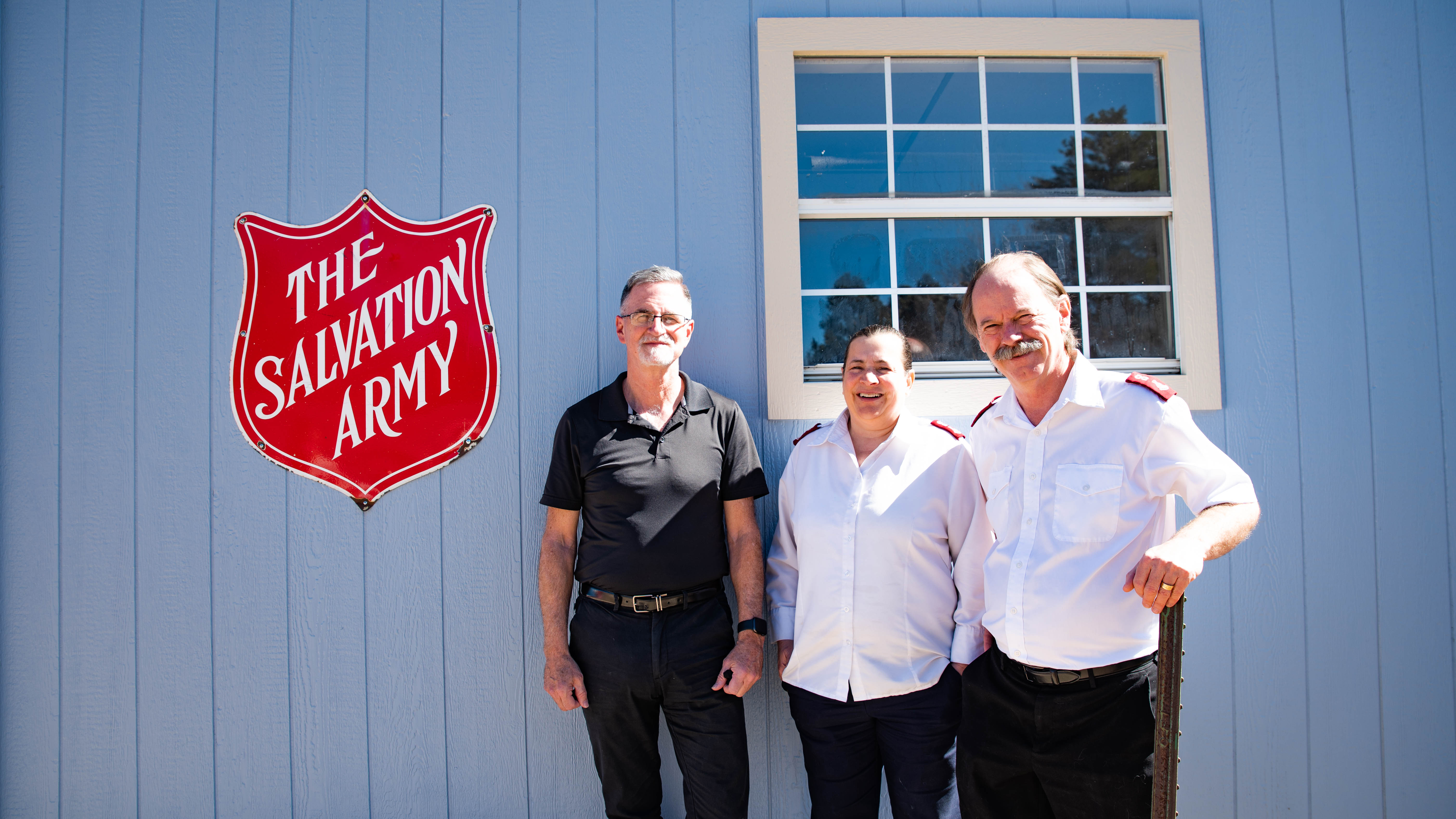Thrifting comes in many different shapes and forms, impacting communities in diverse ways. In Denver, the thrifting scene is founded upon the premise of giving back — creating a sustainable, fashionable and selfless environment like no other.
Recently, thrifting exploded in the eyes of younger generations as a way to express oneself fashionably, inexpensively and sustainably. However, thrifting has always served low-income communities. While local thrift stores struggle to balance these different consumers, their overall missions remain.
On one end of the thrifting spectrum lies vintage fashion. To Kelsey McCartney, Good Baby Mgmt Marketing Director and Vintage Vendor for Heir Vintage at Garage Sale Denver, shopping vintage is “an acceptable form of adult treasure hunting. It means I am helping to close the loop on capitalist trajectories that harm certain communities. It means quality and craftsmanship. Like the slow food movement — there is something to be said for slow fashion.”

Garage Sale, a vintage retailer paired with a trendy bar, boasts more than 40 unique vintage vendors. The mission is to combat fast fashion and the abundance of sustainability issues plaguing the industry.
“It’s estimated that up to 10% of global carbon dioxide emissions are produced by the fashion industry each year. Additionally, the industry is the number two polluter of clean water sources globally,” McCartney said. “Bringing a second-hand option to any market, offers high quality, sustainable fashion to residents and visitors alike. Buying and selling vintage clothing and goods reduces the quantity of waste produced. Consumers are seeking out sustainable options in every market. Garage Sale is the answer.”

While thrifting recently emerged as a trend for young people to express themselves and shop sustainability without breaking the bank, it’s important to understand thrifting’s roots. While making a fashion statement is definitely an outcome of thrifting, local thrift stores help lower-income communities find clothing and accessories that they need.
Peak Thrift welcomes Denverites looking to support locally with open arms as well. The store nestled in Denver is not only an accredited thrift store but also a huge supporter of local community members. Alongside nonprofit Urban Peak, Peak Thrift’s mission is to “ignite the potential in youth to exit homelessness and create self-determined fulfilled lives. Anyway that we can support that is what we try to do,” said store manager Oliver Lewis.
READ: Denver Thrift Store Gives Clothes and Its Employees A New Life
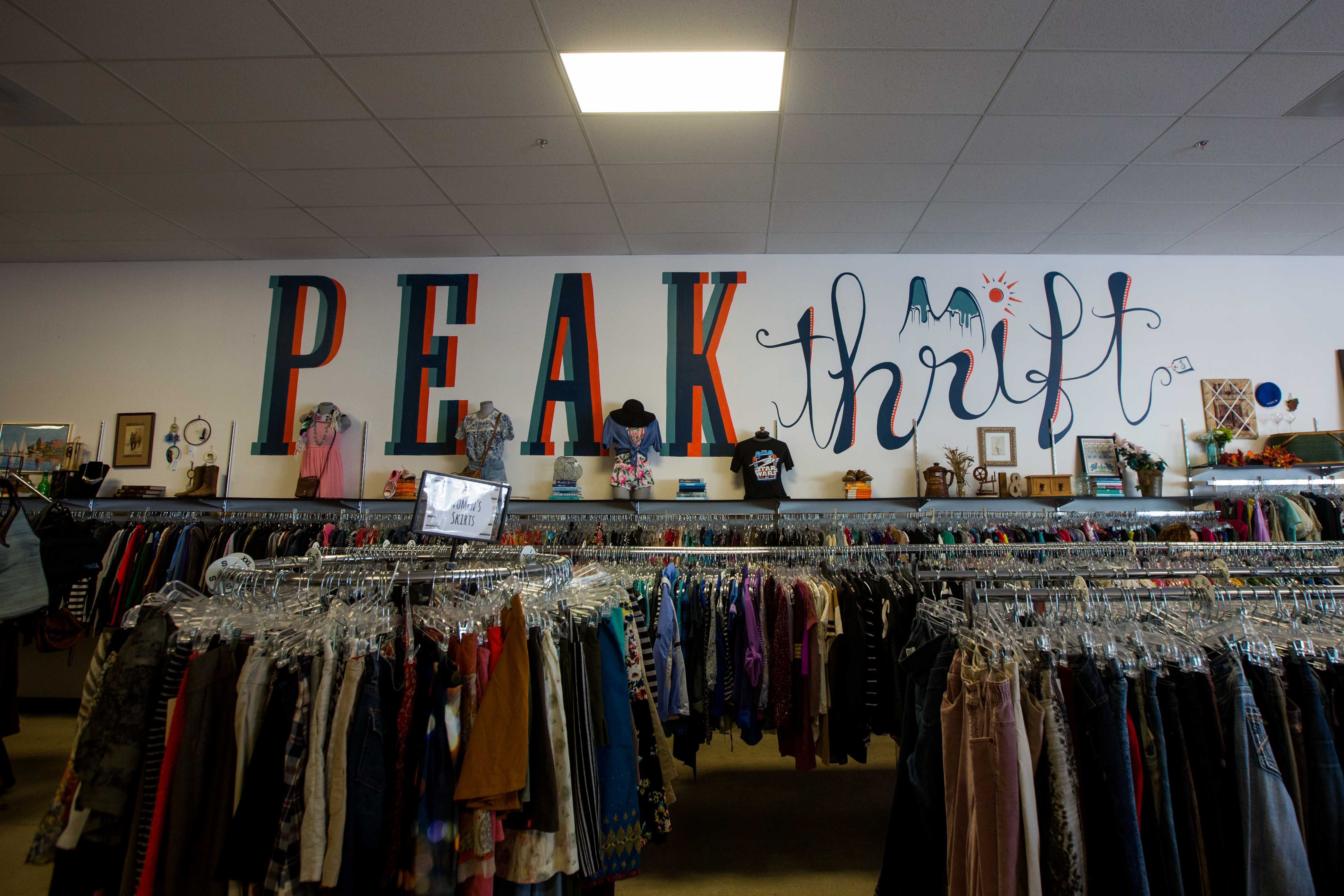
Peak Thrift boasts CDs, vinyl records, magazines, books, clothing, accessories, home goods, art and much more donated by local community members. The store itself is flamboyant, colorful and organized to the tee. Often, thrifting can be overwhelming. However, Peak Thrift offers a comfortable environment for those looking to elevate their wardrobes or those in need of an inexpensive option to help them look and feel like their best self.
The act of thrifting itself is important to Lewis for a variety of different reasons. While Peak Thrift is known for its community outreach and support for the local homeless population, the effects of working in an industry founded upon the idea of giving back make work feel like play.
“I think that thrifting is such a neat thing because it does help used things get a new life. And it means that people who maybe are not able to buy items new can go to the store to shop for whatever reason. Whether that’s because they don’t have income, or because they are displaced because they’re not working, they’ve become displaced from work and school, whether they’re homeless, whether they’re traveling, you know they can come into a thrift store and find something for themselves that they wouldn’t be able to get anywhere else,” he said.
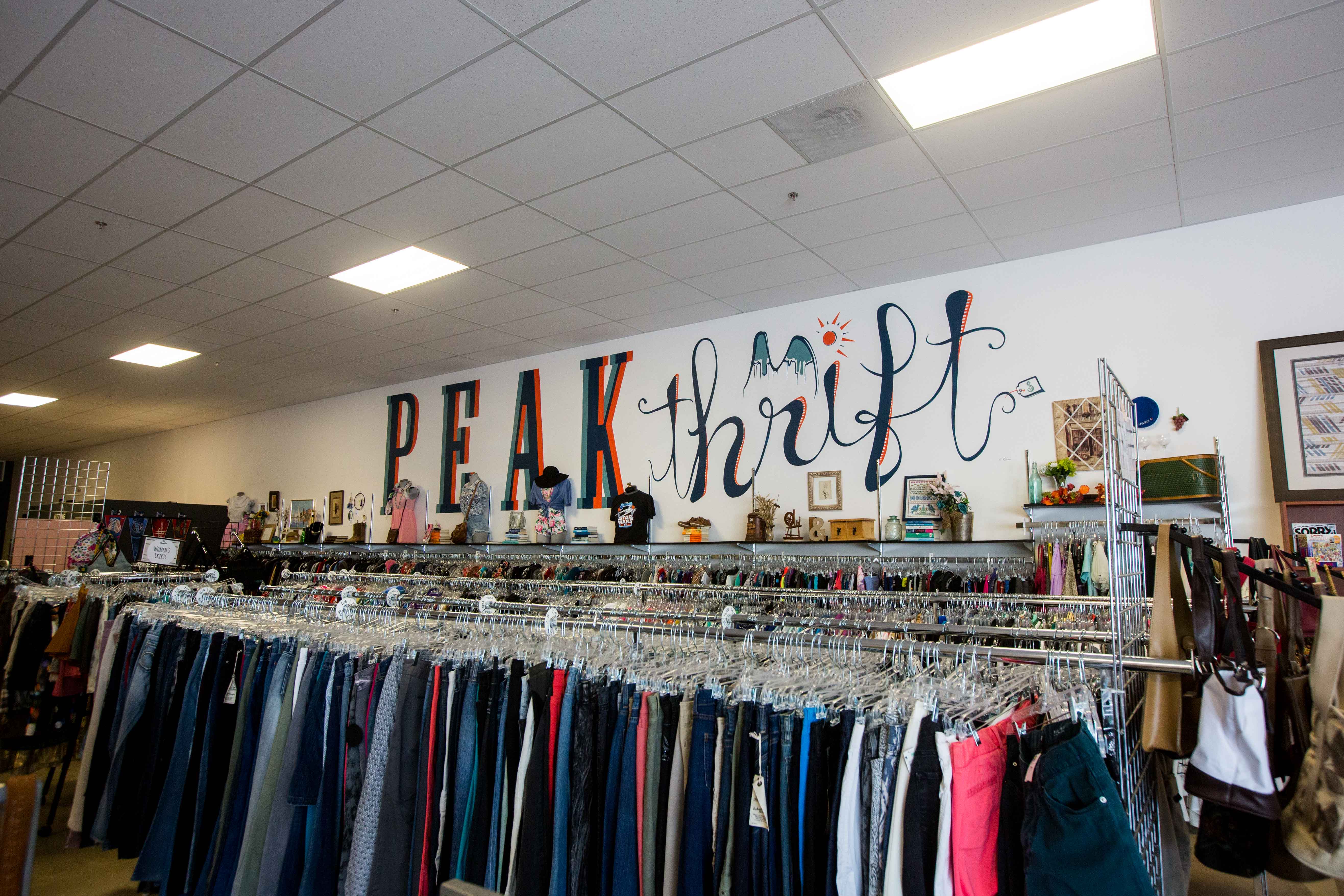
While Peak Thrift strives to support those less fortunate, the store sees a variety of different customers. Adapting to young thrifters and supporting those in need is tricky, but Peak Thrift is up for the challenge.
“We have a very wide variety of customers, a really interesting cross-section I think of that younger, millennial and Gen-Z population that thrifts either because it’s trendy or because they really are interested in the impact that you know, the clothing industry has on the environment. Which is insane,” he said. “And so, we get that population right along with the population of our lower-income … So it’s a split between those multi-generational blue-collar families and this younger kind of population that has disposable income and is able to put some of that money into the community.”
Through Urban Peak’s educational, housing and support programs, clients of Peak Thrift can go through a process to be hired for temporary work experience. Then, they will work in the store as associates. The job entails sorting donations which often takes 6-8 hours daily, managing the front of the store and conversing with customers. The result is a comfortable environment for shoppers and onlookers as well as a priceless opportunity for Urban Peak clients to get on their feet.
For Lewis, Peak Thrift gave him a purpose. He originally wanted to enter the hospitality industry and work in hotels. After going through a gender transition, he realized his sole purpose in life is to give back to others. Lewis found a home at Peak Thrift, where this purpose took shape.

“It supports me. It gives me something I need … I have learned there are people in this organization who have been here for a dozen years. And everybody in this organization is a part of it because they absolutely believe in the mission, and to me, that passion and that ability to show up every single day is so incredible,” he said. “I work with such incredible people and really I aspire to be more like them just really with the passion and the drive that they have to give everything that they can to this.”
Sometimes, fashion connoisseurs look down on the act of thrifting due to the thrift stores that come with it. Stores like Goodwill often get a bad rap due to the profit they gain and the waste they accumulate. However, their goals in providing inexpensive fashion for anyone who needs or wants it is what matters most. Lewis reiterated this as local thrift stores will always be doing more good than large corporations, regardless of their mission.
“Be gentle with your local thrift store,” he said. “A lot of times, thrift stores are running on very small staffs and with very limited resources. So I think there’s a conception that every thrift store is like a Goodwill where we can accept whatever you bring to us and make it work or throw it away and a lot of times that’s absolutely not the case.”
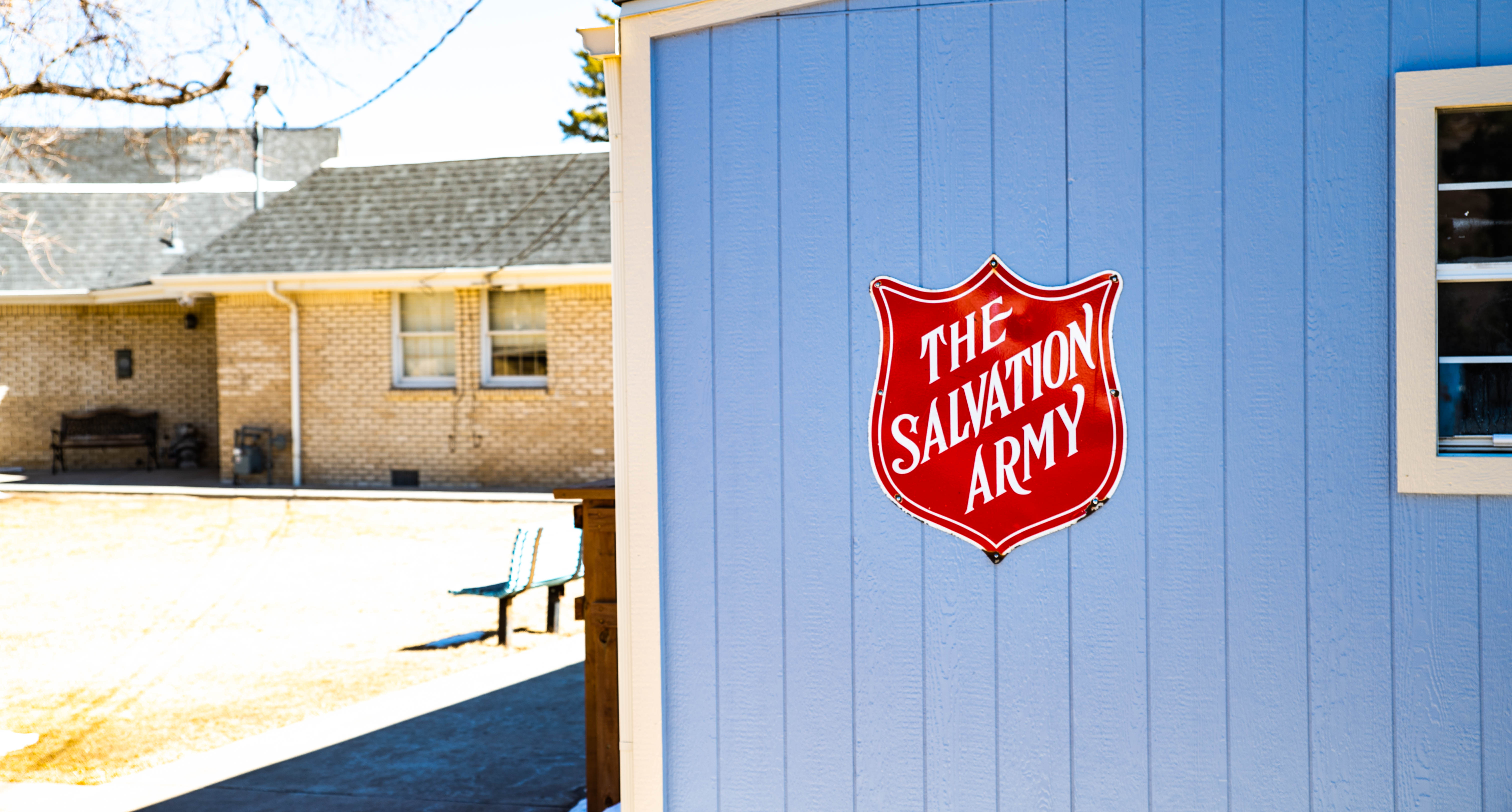
Peak Thrift’s profound impact on individuals like Lewis is monumental to the store’s growth and community outreach. The Denver community is also home to The Salvation Army, an organization that fosters this meaningful impact on a larger level.
In the past year, the organization faced backlash regarding issues of discrimination against the LGBTQ+ community. In association with the Christian church, some of The Salvation Army leaders and members openly voiced anti-LGBTQ+ sentiments, leading to frustration within communities that actively support the organization.
According to Forbes, “the organization is officially welcoming, but its members and leaders still firmly oppose marriage equality and gender identity, and make no secret of their homophobic and transphobic religious beliefs.”
In response, The Salvation Army National Spokesperson Lt. Col Ron Busroe reiterates the organization’s overall mission: “We are at the front lines of serving those in need,” he said.
The organization’s impact on communities in need is profound. According to Advocate, “The Salvation Army is the largest provider of drug and alcohol recovery services in the U.S., Busroe says, and it also offers shelter for the homeless, disaster relief, assistance for former prisoners reentering society, and more. It serves about 25 million people in the U.S. annually, and it has operations in 128 countries around the world.”
While there is still progress to be made regarding the issues surrounding the organization nationally, Denver depends on local Salvation Army stores and its mission to better the community. In addition to thrift stores around the state, The Salvation Army fosters a rehabilitation program for women struggling with addiction and substance abuse.
The program welcomes women into a home where they can establish a routine and start over. For six months, around 27 women live in a home together and abide by rules when it comes to cooking, cleaning and taking care of themselves. They work in the retail thrift stores during the day to acclimate themselves to the workforce. Many learn valuable lessons they would not be exposed to anywhere else. The program gives “them some accountability, responsibility, stuff they’ve never had, you know some structure they’ve never had before so when they go back into the world after they get their lives back being through our program, they can handle that,” said Scott Paul, Director of Operations at The Salvation Army.
The life skills and confidence that the women gain from the program are unlike typical rehabilitation centers. The program offers a relief of mind, body and soul to guide the women on their journey to sobriety. Living in an environment and working together in The Salvation Army thrift stores establish a means to hold each other accountable and to learn how to care for themselves and their being. Following the program, women are prepared to enter the world as better versions of themselves.
“I see broken people come in and … closer to whole people going out so it’s good to be a part of,” Paul said in regards to the effects of the program.
Majors Rachel and Jim Gallop run the rehabilitation program. They refer to many of the women a part of the program past and present on a first-name basis, and it’s clear how much they adore what they do. The two are passionate about helping the women that enter this program recover spiritually, emotionally and physically. Many have never known what the comfort of a home or a family feels like. At The Salvation Army, they learn how to love and feel loved.
Working in the thrift stores is a major aspect of recovery for members of the program. “We try to move it around so they know every department and everything in the store. That’s important they have to keep track of how many garments they sorted, how many garments they hung up,” Rachel said. “The detail of your recovery, whether it’s in the store or it’s here [is in] every detail. If you go down the wrong alley, you can relapse. So you have to be aware of what’s happening around you.”
The Salvation Army thrift stores take pride in giving back to Colorado communities. Similar to Peak Thrift, The Salvation Army serves different groups of customers. From local families fortunate to shop at low prices to college students taking the thrifting world by storm, our local Salvation Army stores are equipped with donations of all kinds. Acknowledging the issues regarding sustainability in the fashion industry, The Salvation Army retail stores are aware of environmental injustices and have taken action.
“We were green before anybody else was green, I think. In a way with our donations because every donation that goes through our store and doesn’t sell, we have a way of handling it that doesn’t go into landfills,” said Paul. “There’s some stuff that does go into landfills because that’s just the nature of the business, but the majority of it, like clothing that doesn’t sell, we pull it back off the floor and I have a source we sell to and they give it overseas because they have a way of using the product.”
For Paul, the emotional aspect of the job is what keeps him going. Though often the job is aligned with similar retail positions, working at The Salvation Army is different. This is because “the only requirement we have for our program is that you’re broken. It doesn’t matter who you are or what color you are or anything, we’re here to fix people.”
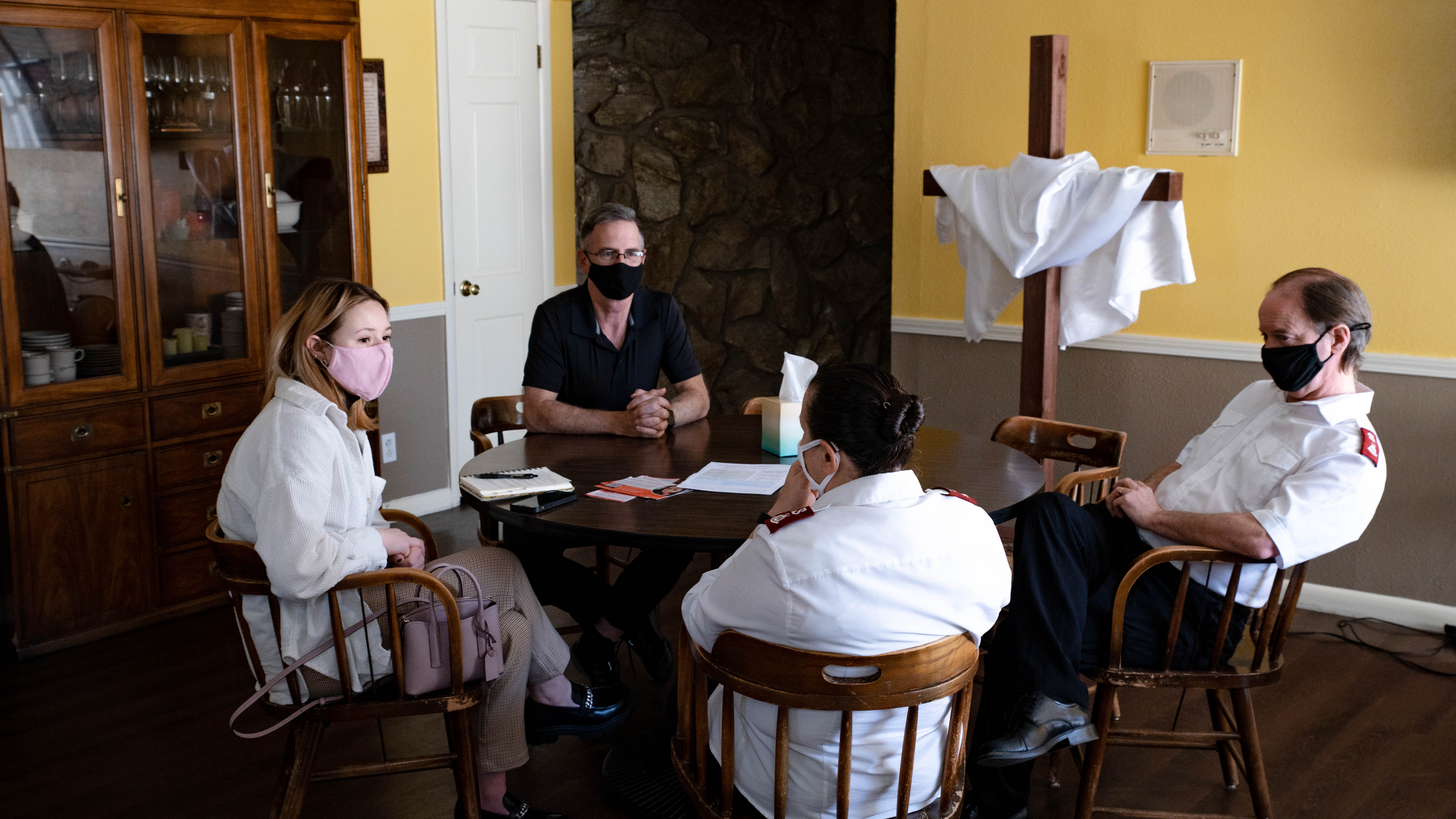
Often, thrift stores provide a judgment-free zone for shoppers in need of something for an upcoming event, a special occasion, or an everyday outfit. The Salvation Army sees people leave their stores with suits for job interviews that they couldn’t have bought anywhere else at the price they can afford. Someone may walk into a Salvation Army as one person and leave as a different person — with whatever they desperately needed in tow.
The Salvation Army and its mission are unique, making it a staple in the Denver community. The rehabilitation program specifically stands above the rest as the sole female-only Salvation Army program nationwide. “We work with the whole body-mind, body and spirit,” Rachel said. “I really like the residential program because they teach them how to live again.”
Whether it’s shopping vintage or thrifting, being fashionable and expressing ourselves through style doesn’t have to hurt the environment. Luckily, Denver fosters the increased popularity of thrifting for those who want to buy secondhand clothing as well as those who need to.
Our local thrift stores are giving back — to the homeless, to those in need, to those struggling to get on their feet and to the environment.
Ultimately, thrifting as an emerging trend among higher socio-economic classes is not necessarily a calamity. Thrifting itself is complex in the ways it serves different communities in distinct ways, but overall the sustainability intertwined with the process of buying second-hand makes all the difference.
Visit Garage Sale at the Larimer Square location – 1460 Larimer St. Denver, CO 80202.
Learn more about Peak Thrift and its mission in supporting Denver or visit the store at 4890 N Pecos St, Denver, CO 80221.
Make a one-time donation or a recurring monthly gift to The Salvation Army rehabilitation center and direct women struggling with substance abuse to the program by calling 800-728-7825.





